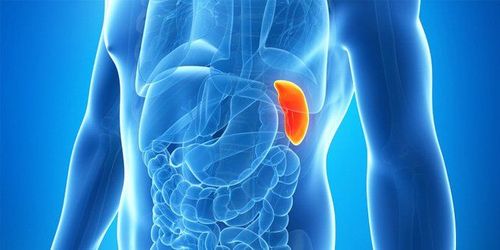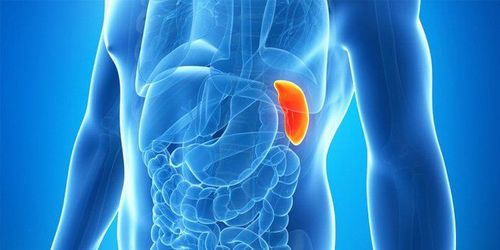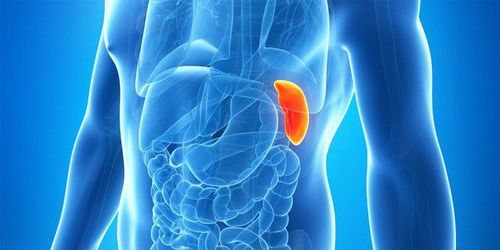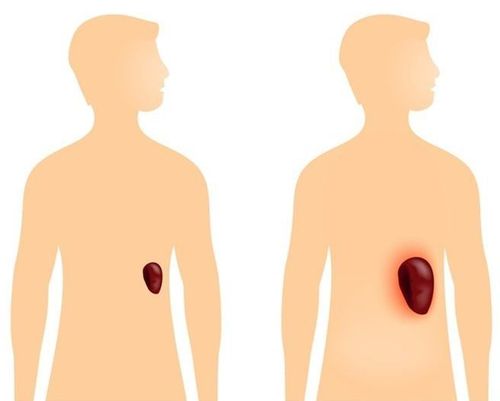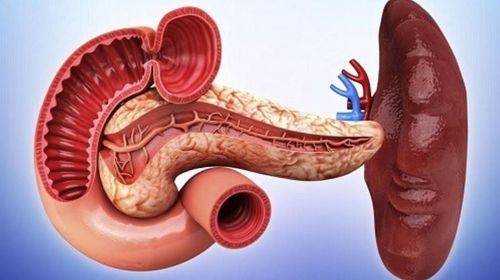This is an automatically translated article.
The spleen is one of the organs that holds many important functions of the body, helping to produce blood cells, store blood, but also create antibodies capable of fighting viruses that attack the immune system. An enlarged spleen indicates that the body has an infection, or some other health problem. Early diagnosis and treatment are essential to prevent potentially dangerous complications.
1. What is an enlarged spleen?
The spleen is an organ located below the rib cage on the upper left side of the abdomen and toward the back. It is part of the lymphatic system and acts like a drainage network to help the body fight infection.
Inside the spleen are white blood cells that are responsible for destroying bacteria, dead tissue and foreign objects, and then removing them from the blood through the blood flow through them. In addition, the spleen also plays an extremely important role in maintaining healthy blood cells, red blood cells and platelets. This organ is also involved in the filtration of blood, helping to remove abnormal blood cells.
Normally, a spleen is about the size of your fist. It is very difficult for the doctor to feel it only through physical examination. When the body encounters some health problems, they can cause the spleen to swell and increase in size many times compared to normal.
An enlarged spleen is not always a sign of a medical problem, however, it does indicate an overactive spleen. When the spleen is overactive in destroying and removing blood cells, the condition is called hypersplenism. This problem can stem from a variety of reasons, including blood disorders or overproduction of platelets in the body.
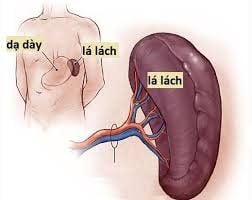
Khi lá lách phải hoạt động quá mức sẽ dẫn đến tình trạng cường lách
2. What Causes an Enlarged Spleen?
An enlarged spleen can be caused by many different factors, including: Cirrhosis, infections, liver diseases, blood diseases characterized by abnormal blood cells, certain problems with the lymphatic system or other conditions.
Here are the main causes of an enlarged spleen, including:
2.1 Infections Parasitic infections, such as toxoplasmosis Viral infections, such as mononucleosis Bacterial infections, such as valve infections heart (endocarditis) 2.2 Cancer Cancer of the lymphatic tissue, such as Hodgkin's disease; or lymphoma Leukemia is a type of malignant cancer in which normal blood cells are replaced by white blood cells. 2.3 Other causes Trauma, such as an injury from participating in contact sports Inflammatory diseases, including lupus, sarcoidosis, or rheumatoid arthritis A cyst filled with fluid Cancer has occurred. metastases to the spleen causing the spleen to enlarge Have large, pus-filled abscesses due to bacterial infections Glycogen storage diseases, or infectious diseases such as amyloidosis and Gaucher.
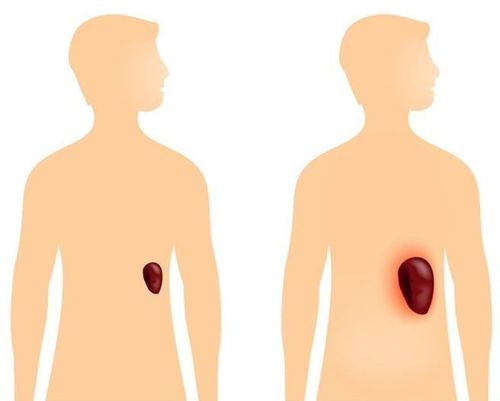
Có nhiều nguyên nhân dẫn đến lá lách to
3. Symptoms of an Enlarged Spleen
Because the symptoms of an enlarged spleen often have no specific symptoms, most people can't feel them. This condition can only be detected through a general physical examination. Here are the most typical symptoms of an enlarged spleen, including:
Unable to eat much Feeling uncomfortable, full or painful on the left side of the abdomen; The pain may radiate to the left shoulder. In addition, an enlarged spleen can also develop other signs and symptoms associated with a number of underlying conditions, including:
Fatigue Frequent infections Weight loss Ease of bleeding Anemia Anemia Jaundice.
4. Factors that increase the risk of splenomegaly
Here are some factors that can increase the risk of splenomegaly, including:
People with Niemann-Pick disease, Gaucher disease, or some other inherited metabolic disorder Children or young adults with the infection infections, such as mononucleosis Subjects who frequently travel for work or travel to malaria-endemic areas.

Sốt rét làm tăng nguy cơ bị lách to
5. Diagnosing an enlarged spleen
The doctor will ask the patient to answer a few questions and perform a physical exam to diagnose an enlarged spleen.
Spleen can be checked through common touch. Sometimes, diagnostic tests are needed to pinpoint the cause of the swelling of the spleen. These tests include blood tests, computed tomography (CT) scans, MRIs, or ultrasounds. In certain cases, other diagnostic methods may also be performed.
6. Treatments for splenomegaly
The spleen can rupture if there is a strong external impact, such as contact sports. When the spleen is ruptured, it will cause the body to lose a lot of blood, even seriously threatening the patient's life. Therefore, early treatment for the causes of splenomegaly is extremely urgent, helping to prevent the risk of spleen removal. If not detected and treated promptly, an enlarged spleen can cause dangerous complications to overall health.
In certain cases, a patient may need to perform a laparoscopic splenectomy instead of open surgery.
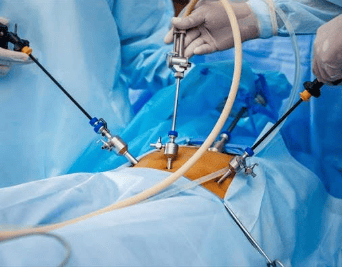
Lách to thường được điều trị bằng phương pháp nội soi
For the laparoscopic approach, the surgery will be done with small incisions, allowing the doctor to see, examine and remove the spleen easily.
When the spleen is removed, the body will have great difficulty in performing its function of eliminating bacteria, so the patient is susceptible to infections. At this time, medication or vaccination is essential to prevent infection.
7. Methods to help control the progression of an enlarged spleen
To control the progression of splenomegaly, you should take some of the following measures:
Limit or not participate in contact sports, such as hockey, or rugby. Wear seat belts while driving to prevent accidental spleen damage Get routine vaccinations to prevent infections, such as flu, pertussis, diphtheria vaccine, Tetanus. Periodic health check-ups to monitor the progression of the disease Change to a healthier lifestyle by eating sensibly to help strengthen resistance and limit the use of stimulants such as alcohol and beer.
Please dial HOTLINE for more information or register for an appointment HERE. Download MyVinmec app to make appointments faster and to manage your bookings easily.
Reference source: webmd.comMORE
Is an enlarged spleen dangerous? Steps to perform ultrasound diagnosis of splenic disease Spleen rupture: How to treat?




